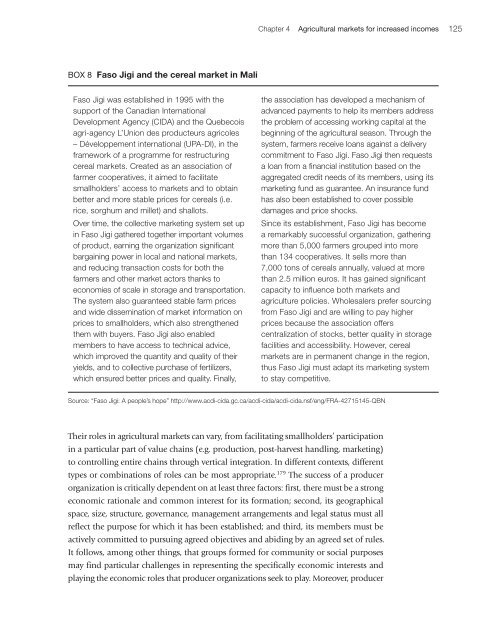English - IFAD
English - IFAD
English - IFAD
Create successful ePaper yourself
Turn your PDF publications into a flip-book with our unique Google optimized e-Paper software.
Chapter 4 Agricultural markets for increased incomes 125<br />
BOX 8 Faso Jigi and the cereal market in Mali<br />
Faso Jigi was established in 1995 with the<br />
support of the Canadian International<br />
Development Agency (CIDA) and the Quebecois<br />
agri-agency L’Union des producteurs agricoles<br />
– Développement international (UPA-DI), in the<br />
framework of a programme for restructuring<br />
cereal markets. Created as an association of<br />
farmer cooperatives, it aimed to facilitate<br />
smallholders’ access to markets and to obtain<br />
better and more stable prices for cereals (i.e.<br />
rice, sorghum and millet) and shallots.<br />
Over time, the collective marketing system set up<br />
in Faso Jigi gathered together important volumes<br />
of product, earning the organization significant<br />
bargaining power in local and national markets,<br />
and reducing transaction costs for both the<br />
farmers and other market actors thanks to<br />
economies of scale in storage and transportation.<br />
The system also guaranteed stable farm prices<br />
and wide dissemination of market information on<br />
prices to smallholders, which also strengthened<br />
them with buyers. Faso Jigi also enabled<br />
members to have access to technical advice,<br />
which improved the quantity and quality of their<br />
yields, and to collective purchase of fertilizers,<br />
which ensured better prices and quality. Finally,<br />
the association has developed a mechanism of<br />
advanced payments to help its members address<br />
the problem of accessing working capital at the<br />
beginning of the agricultural season. Through the<br />
system, farmers receive loans against a delivery<br />
commitment to Faso Jigi. Faso Jigi then requests<br />
a loan from a financial institution based on the<br />
aggregated credit needs of its members, using its<br />
marketing fund as guarantee. An insurance fund<br />
has also been established to cover possible<br />
damages and price shocks.<br />
Since its establishment, Faso Jigi has become<br />
a remarkably successful organization, gathering<br />
more than 5,000 farmers grouped into more<br />
than 134 cooperatives. It sells more than<br />
7,000 tons of cereals annually, valued at more<br />
than 2.5 million euros. It has gained significant<br />
capacity to influence both markets and<br />
agriculture policies. Wholesalers prefer sourcing<br />
from Faso Jigi and are willing to pay higher<br />
prices because the association offers<br />
centralization of stocks, better quality in storage<br />
facilities and accessibility. However, cereal<br />
markets are in permanent change in the region,<br />
thus Faso Jigi must adapt its marketing system<br />
to stay competitive.<br />
Source: “Faso Jigi: A people’s hope” http://www.acdi-cida.gc.ca/acdi-cida/acdi-cida.nsf/eng/FRA-42715145-QBN<br />
Their roles in agricultural markets can vary, from facilitating smallholders’ participation<br />
in a particular part of value chains (e.g. production, post-harvest handling, marketing)<br />
to controlling entire chains through vertical integration. In different contexts, different<br />
types or combinations of roles can be most appropriate. 179 The success of a producer<br />
organization is critically dependent on at least three factors: first, there must be a strong<br />
economic rationale and common interest for its formation; second, its geographical<br />
space, size, structure, governance, management arrangements and legal status must all<br />
reflect the purpose for which it has been established; and third, its members must be<br />
actively committed to pursuing agreed objectives and abiding by an agreed set of rules.<br />
It follows, among other things, that groups formed for community or social purposes<br />
may find particular challenges in representing the specifically economic interests and<br />
playing the economic roles that producer organizations seek to play. Moreover, producer

















